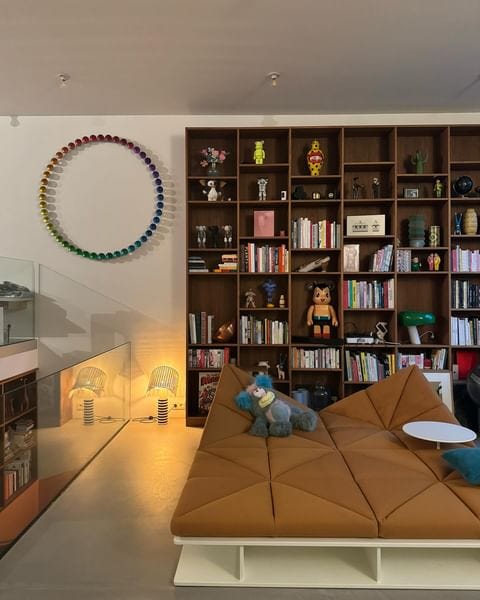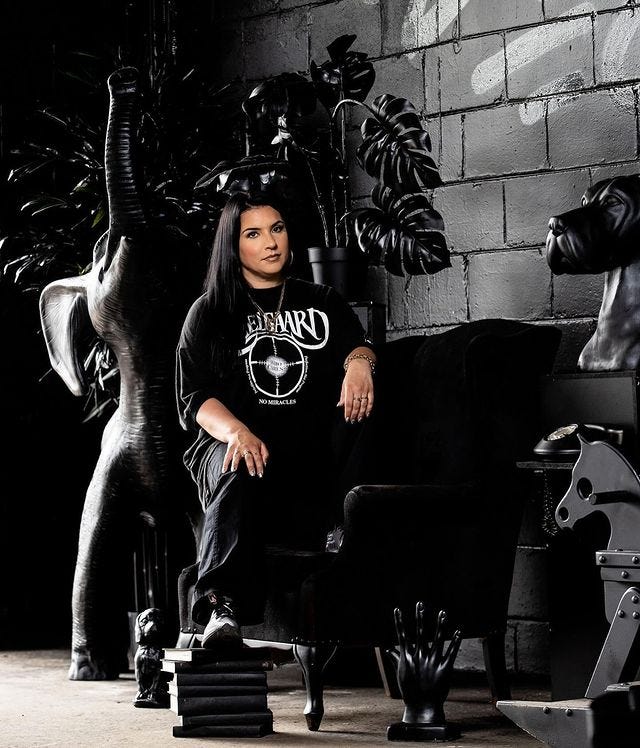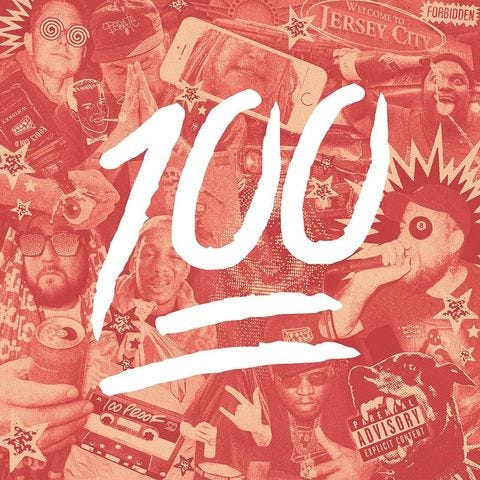a deep dive w/ Dj's on the state of creativity, nightlife, social media, + youtube virality
youtube radio stations, social media club kids and more
Hi! Sorry it’s been a moment between Sends. Things got a little hectic and i’m still figuring out how to balance my new freelance schedule. We’re here though.
The past few weeks (actually maybe a little over a month now) I’ve been thinking a lot about djing, producers, and how there’s an interesting dj-specific moment happening in the ~creator economy~. Full credit due to my brainiac friend Nur Ozdamar who is in the belly of the beast working as head of artist + label development at Youtube in EU, who sparked the thought around ‘look at these qt lil radio stations popping up everywhere on Youtube’. My lil youtube rabbit hole left me with a lot of questions about what it must be like to be a dj right now? why has it become a whole other thing?
For today’s send I’m mostly sharing some insights from Jubilee aka Jess, Nick Catchdubs, and Martyn Bootyspoon aka Jason, all of whom have been successful in their own right as producers, djs, label founders/heads and all that comes with that stuff.
To me, watching this space has been interesting because I believe it’s a microcosm of how MANY people in creative industries have been impacted by shifting distribution mediums/channels. Why are we flattening and forcing every subculture and act of creativity into compartments defined by tech companies in san francisco? Djs are also interesting because they pick up on social/energetic change before anyone else, being that they are literally conductors of youth at the fringes. Anyway, here’s the big bullet points of what i’ve seen.
1. the pandemmy sparked the shift - DJing is now officially a visual medium. Covid was a catalyst, and now the big names and even the audience have completely shifted into “normie” territory driven by Youtube algorithms and viral moments.
The proliferation of vibey, set-designed and styled youtube ‘radio’ stations, with cute people dancing, chilling, and just generally being ‘seen’ in the mix seem to be the main event now vs. actually going to a party. Here’s just a few examples:
Culture FM (afrobeats by way of london)
aprtment life (london and some other places)
Bookclub radio (mostly house via nyc)
incredible coffee (hip hop and a bit of everything via tokyo)
drum & bass on the bike (cyclists linking up worldwide to rave)
Ofc this is not to forget the OG’s Boiler Room, Lot Radio etc which have been doing this exact thing for A LONG TIME. Once you watch even a couple of these your algorithm will be flooded with them, so enjoy. I’ve also noticed djs trending because of unique mash ups or just popping out off the feed with a certain… je nai se quoi. These are the djs more likely to get booked due to high follower counts.
So why is it more visual now?
Nick: “IMO, everything is more of a visual medium [now].”
Jason: “I think this sky-rocketed in the Pandemic, where no one under the age of 18 worldwide had a sense of what a club was or what was DJed inside of a club, what was expected of a DJ, or what dance music even… was”.
Jess: “Alot of DJs stayed streaming [during covid lockdowns] and the scene changed alot while everyone was at home. Hoer Berlin got extremely popular and then this crazy thing happened where the Fred Again Boiler Room just blew up. People that were never even into dance music became huge fans of his and Boiler Room at the same time. I think the new generation of Djs basically grew up online, so that's definitely a part of it.”
2. DJs and producers are used to being behind the decks, keyboard, or, in the instance of radio, just in your ears. Now, like everything else, they are expected to perform for a camera, which has changed how they work/ maneuver, and created anxiety:
Nick: "It’s not just image based / “look at me” stuff (we’ve always had photos) but more like a series of interconnected parasocial relationships. Why do I know what Peggy Gou’s living room looks like? Aesthetics are part of it — was there ever a time when hot people didn’t get work? — but also values, perceived or otherwise. It’s clique-y, especially somewhere as dense and (sadly) self-segregating as New York. Again, you don’t have to care about it, but if you do, a scene’s pants, playlists, and political IG infographics are definitely linked.”
Jess: “Some Djs have really had certain "viral moments" that have made their career, The famous Sherelle Boiler Room, Fred Again Boiler Room, etc. People are now constantly trying to do that but you cant control a viral moment. […] I personally think its annoyying because how much could you possibly do as a dj, people are pretending to twist knobs and acting so weird now lol. It's also so much pressure to have a "look" etc. So yes, hotter DJs are getting opportunities, lets not pretend they arent.”
Jason: “There was immense pressure for this weekend in Montreal [his first broadcasted Boiler Room set] (self-inflicted.. but) over being cognitively aware that if I didn’t completely tailor my set, my outfit, my choreography, whatever I had on stage to skirt my natural generalised anxiety tendencies to just drink more alcohol or scroll through music on the CDJs, it would get lost in the Content Sea. What I quite literally manufactured worked, I am now like… a quarter million IG Reel views up on my “recap” video, based on the fact that I did all that shit I mentioned above that I would otherwise normally not do. I am very good at turning my brain off when it comes to “Cringe Creating” (for a lack of a better word), I have a college degree in Communications and a BFA…I know what works. Do I want to have to resort to doing that all the time? Not really, lol.”
3. artists /djs/producers are canaries in the coalmine of a DIY creator economy gone wild. being a one-person start-up is exhausting and not exactly generative for creativity. I asked if djing/production has always involved this much ‘cross-functional’ work trying to wear a million hats (making the music, marketing it, designing merch, touring, having a day job, etc), when they elect to ask for help, and what its like being in a constant state of shipping projects:
Jess: “Right now I am struggling with exactly this. I have music coming out, but now I feel pressure to have a story, merch, an aesthetic, pictures with a theme, etc and I am like ummmmmm HOW does anyone do this without a million dollars right now?”
Jason: “It always helped to be industrious. Alice Cooper observed Iggy Pops career, and basically did the same thing but more “Glam”, and he became wildly more successful. Alice Cooper’s revenue stream at his peak was INSANE. The same is true to any artist in dance music, having all these revenue streams is incredibly crucial towards world-building, having income when you’re not as in demand for bookings etc. HOWEVER. It never seemed to be this turbo and DIY for artists like myself who are trying their best to stay afloat and sane.”
Nick: “It’s like a start-up in that you have to work very hard with no guarantee that it will work out. But when a start up sells, there’s $$$ to split amongst the shareholders. Sharing the pie of a Wednesday night club gig (LOL) or Spotify payout (double LOL) is very different. There’s tricks for social media engagement, and tons of people you can pay to show these tricks to you. But I think a lot of folks get caught up in the idea of appearing “pro” — paying for PR, photo shoots, etc — rather than soberly looking at the numbers and their ROI. Margins are slim at best, and you can’t pay to blow up; nothing sticks unless ppl are fucking with the music to begin with (in which case, paid ads / boosted posts can help amplify the reach of an existing moment).”
Jason: “Personally, because I am not a grifter [i will only ask for help when i can pay people]. Which, arguably, is to my detriment… Otherwise, I’m mixing and mastering my tracks myself on my self-releases, artwork by Me, I’m sending to distro, I’m sending DJ mailers, I’m doing the fucking Spotify 9:16 Canvas video bullshit, I’m doing the ad creative if necessary. I’m releasing something on Fool’s Gold this summer and this is the 2nd time in 6 years I’ve been offered a decent budget to pay someone adequately for a release artwork, and so I did.”
4. Social media has driven so much of the change at play, so I asked them how they felt about it; was their relationship positive, negative, neutral, etc? This is something i’m generally curious of with creative people in general because it has increasingly become ‘part of the job’.
Jess: “My relationship [with social media] is funny. While I know Myspace, Twitter and message boards really helped my career very early on, I absolutely hate what it has become. At least then you would make a mixtape and people would listen to it. Anything I ever did at that time was really genuine and came naturally. Now I feel like if I didn’t post a pic of myself to promote, a video to prove it happened and content around everything that it's almost as if I didn’t do anything at all. Every time I put out music, which takes A LOT to make, i have to put equal effort into social media or not even bother releasing. And not to mention looking at everyone else's socials all day and feeling like you aren't doing enough. It also doesn't help that Meta is constantly working against you.”
Jason: “If I didn’t have to do it, I wouldn’t. It’s become such an unnecessary rat race. If you actually have an objectively earnest and personal account with actual substance, it’s overshadowed by Content Creator Cattle Feed Accounts and Bots. I rarely find it drives an audience into learning about me, it’s just a calling card for promoters (and thus bookings) at this point. It’s mainly frustrating.”
Nick: “Social media is just a tool like anything else. I’m fortunate to be able to choose my own level of engagement — I have a relatively established career, other sources of income and am old enough to not care either way — but understand why someone coming up might feel very differently. My main frustration is that these platforms keep moving the goalposts and changing their algos; I wish the people who literally follow me would be able to see my posts.”
5. I had to ask the reporters from the front lines (i.e the club). Are the kids ok?
Jess: “No one is alright lol. Why would they be? WAY more people like underground dance music now which is great. But that also means your dancefloor is full of way more "normies" which is good and bad. A lot of really entitled people that just do not know how to act, but also a lot more people are identifying as queer now which makes nightlife so much better. Going out is INSANELY expensive now which definitely kills the vibe. Drugs are also different now. Way more people doing ketamine than before, Also a lot of fentanyl issues, so alot more harm reduction and awareness.”
Jason: "Double-edged sword. On one hand, people are open to so many more genres now because of Spotify and Tik Tok… but because these platforms thrive on catering to The Listener as The Individual…. Because Tik Tok is a narcissistic algorithm tailored towards You, The Viewer… Because these kids have never been to a club before, have never had to DJ in scenarios managing expectations of bar / club managers to hit sales targets etc…. People are literally holding up a phone to your face asking for Bad Bunny when you’re doing like 8000 mental calculations on what next 3 tracks to play, more so than they ever were before lol.
The biggest silver lining for me is that regionally, you can play any sort of music anywhere and so long as it isn’t a room full of ego-maniacs, you’ll have a great time playing to an actual new school of great dance music listeners. So that’s honestly been very fun.”
6. the tension of photography, cameras, and social media has also driven more crowds toward places with ‘no cameras’ policies - famously, Berghain but many others have followed suit. Basically it feels like nightlife exists at two opposite ends of the spectrum: extreme performance and then extreme degen ‘lose yourself’ anonymity spaces and vibes.
Jess: “Cameras can be a vibe killer for crowds. how are you supposed to really let go, do weird shit, make out with strangers etc when you are risking winding up on some assholes TikTok making fun of you. I am not mad at the no cameras policies in places at all.”
7. Successful creatives need to always rely on a delicate dance between serving the hardcore fans, the staples of a community, the VIPS, and those who are more casual participants. Jess has a great quote for this, but I think it applies almost universally to any creative scene or community.
Jess: I love this quote from John Barclay in Resident Advisor:
"There exists, for lack of a better term, a scenester vs. normie dichotomy that most of us aren't ready to acknowledge," Paragon> owner John Barclay told RA. "The scenesters are hotter and cooler and certainly dance better but they spend no money. The normies are generally more annoying and less respectful of dance culture but are willing to pay what it costs to keep the scene alive."
"Without the normies we have no way of paying the rent, DJs and staff. Without the scenesters the culture devolves into Señor Frog's. We need both for the ecosystem to survive and it's not an easy balance to strike."
As a final thought, seeing as so many people subscribed to this newsletter work in the business of culture- brands who sponsor it, agencies who come up with ideas for it etc - DJ’s and producers are incredibly resourceful people. If you need help with just about anything on a music, youth, creativity, or nightlife-related brand project, they can probably assist in an outsized way.
Thats all for today. Later this week i’ll be back to link round-ups and regular programming - hope yall liked this lil peek into dj world + nightlife culture.
GG x














So many eye openers here. Kids who haven't been to a club before? (Cannot imagine!) Scenesters vs. normies. So rich. I feel like that could be applied to so many other scenes. I love what you do! I feel so much closer to cool every time you put out a newsie.
Loved — on a different note — DJ as social catalyst post RONA is something I’m fascinated by. There’s something to be said of the subcultures developing around certain DJs — newer/rising DJs curating groups of listeners amongst friends/friends of friends, reaching the point where other groups of fans/communities develop, bringing a really cool mix of ppl together. Fans with different connections (personal or just from pure appreciation) to these DJs coming together and vibing — sets are becoming a great place to meet new ppl IMO, especially in NY